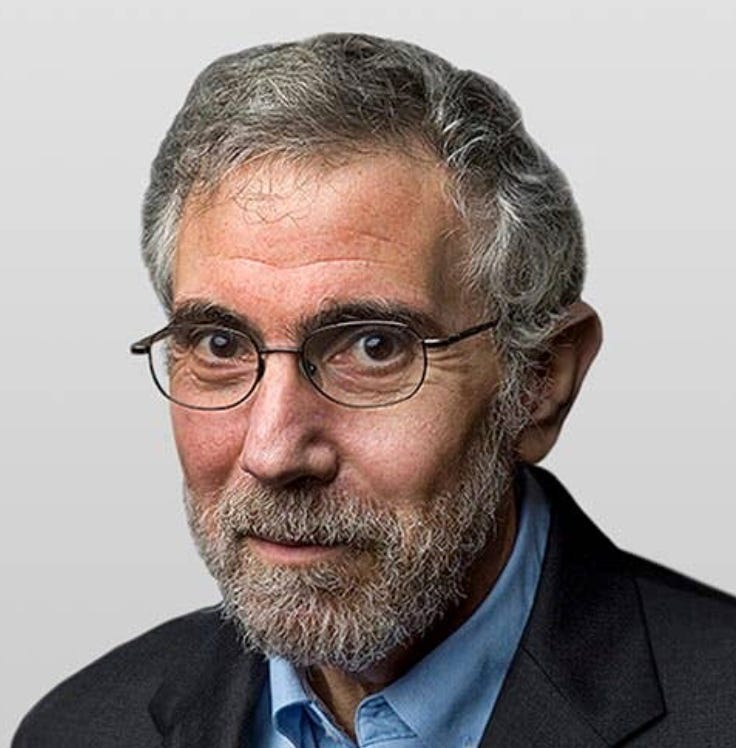Paul Krugman, pragmatic Keynesian, leaving the Times
When writing about health care, the Nobel Prize-winning economist wanted single-payer but defended Obamacare.
I only met Paul Krugman once, over lunch in Washington, D.C. in 1999. He was on a tour promoting his latest book, “The Return of Depression Economics,” which I later reviewed for the Chicago Tribune.
A currency crisis had recently plunged a substantial share of the developing world into a Great Recession (his caps). In his concluding chapter, he wrote, “For the first time in two generations, failures on the demand side of the economy — insufficient private spending to make use of the available productive capacity — have become the clear and present limitation on prosperity for a large part of the world.”
Unfortunately, monetary economists controlled the commanding heights of theory and the minds of leading policymakers. They demanded austerity for countries like Russia, South Korea and Indonesia, whose currencies had collapsed. Krugman, a fervent Keynesian, would have none of it. “The truth is that good old-fashioned demand-side macroecononics has a lot to offer in our current predicament — but its defenders lack all conviction, while its critics are filled with a passionate intensity.”
No apologies to William Butler Yeats needed. Krugman was always full of passionate intensity. He called then, as he would when the housing bubble burst in 2008 and the Covid calamity hit in 2020, for massive government spending to rescue the U.S. economy from deep, long-lasting depressions.
Krugman on health
Krugman frequently wrote about health care reform, where his intellectual jouney was similar to mine. He supported single-payer insurance (Medicare for All) and even backed wider government ownership of hospitals, physician practices and other providers. But when the newly-elected President Barack Obama opted for incremental reform, he threw his support behind the 2010 Patient Protection and Affordable Care Act, which eventually succeeded (over near unanimous Republican opposition) in cutting the uninsured rate in half.
As this year’s presidential campaign heated up, he laid out the law’s successes in his Times newsletter column. He warned that Obamacare’s successes could be undone if Donald Trump returned to the White House:
It didn’t provide universal coverage, but it did provide health insurance to millions of Americans, some of whom desperately needed that safety net, and it did so without breaking the bank. Predictions that the A.C.A. would be unworkable have been proved wrong. At this point, the only serious threat the program faces — and it is a serious threat — is political: People who kept insisting, wrongly, that health care reform would die of its own accord may simply step in to kill it.
Enemies of the A.C.A. now control of the White House and both houses of Congress. The general public is far more upset about the affordability and adequacy of their insurance policies than the fact that 8% of the population is still uninsured or a comparable number face the threat of losing their coverage if the GOP cuts subsidies.
The backlash has turned toxic. We still don’t know the motive for UnitedHealthcare CEO Brian Thompson’s murder or why the assassin left behind shell casings etched with “deny,” “defend" and “depose,” but based on their social media postings, tens of millions of Americans have already decided he deserved it.
We are living through an age of rampant disinformation. Well over half the population doesn’t have the foggiest notion of how health insurance works, why their bills are constantly rising, or how leaving a large portion of the population uninsured makes those bills higher. The mainstream media does almost nothing to explain it. They are vulnerable to propaganda on the political right that portrays Obamacare beneficiaries as scapegoats.
Here’s one way to offer a counter their misinformation:
When someone without insurance gets sick or seriously ill, they don’t avoid care. They postpone it. And when getting the health care they need becomes a matter or life or death, they get it at the most expensive place possible — the emergency room. Then, when they don’t pay their bills because they have no insurance, providers pass those costs along to everyone else by raising prices. Government has an obligation to subsidize the cost of insurance for those whose employers don’t provide it and who can’t afford it on their own because universal coverage remains a necessary though not sufficient condition for reducing everyone’s health care costs.
As we head into the new year, let’s remember to share that message as widely as possible with Krugman-like intensity. I hope the 71-year-old economist (three years younger than me!) finds another venue for sharing his wisdom. Welcome to semi-retirement, Paul.





I agree the prospects are grim. But it will be a lot easier to stomach if we fight them every inch of the way. The impact of the extreme elements of the Republican agenda will be wholly negative on the economy. We need a good rejoinder on the health care side on how to clean up the insurance mess. I plan to offer some ideas in the weeks ahead.
So sad.